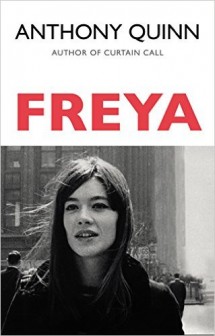Freya (Anthony Quinn)

The best thing about this, Anthony Quinn’s fifth novel is its unsympathetic protagonist. Freya Wyley, (twenty at the commencement of the novel and the end of World War 2, forty or so at the end of the story), is bold, rude, devious, suspicious and smug. She lacks insight and never learns. After repeatedly wrecking lunches, parties and work meetings with outbursts of vituperative personal abuse and being called to account time and time again, “her habitual response to criticism was one of airy indifference, since it usually came from people not qualified to give it”. The characters are the best part of the book – Freya’s closest friend the gentle and sensitive Nancy, flamboyant Nat and bumptious, selfish Robert. The minor characters are less impressive – somewhat interchangeable ‘types’.
That’s the best thing. The mediocre thing is the story. The predictable coming-of-age of a woman in the 40s, 50s and 60s story. Sex, gazelle-like-models, ‘homophobia’, sexism, Nazism, alcohol (lots of it), drugs, nightclubs. We know what decision Freya will make at two important moral junctures, (and each is the ‘good’ moral choice which a person of her character would not make). The reader is also hard put to believe that Freya’s friends endure decades of her abuse and neglect, coming back for more.
That’s the mediocre thing. The bad thing is the wooden prose:-
“‘Freya!’ The voice cut through the air. It was Jean Markham, also in uniform, with girls whose faces she’d last seen at school two years ago, Sophia and Betty and Maud and Catherine P. and Catherine S. The sternest girl in her year, Jean wore her smile like an unfamiliar lipstick.
‘Jean -‘
‘My, don’t you look smart!’ cried Jean in her parade-ground tone. Amid the flurry of kisses and hugs Freya glanced at the stranger among them, a russet-haired girl who held back rather awkwardly from the rest. She was tall, as tall as Freya, pale-skinned yet luminous, and somewhat ill at ease. Freya’s impression was of an ungainly swan. Jean, all briskness, introduced her as Nancy Holdaway.
‘Not seen her in ages and she telephoned me out of the blue this morning!” There was the faintest touch of annoyance in her tone to suggest that surprise telephone calls were gauche and unwelcome. Freya stared at the girl for a moment before extending her hand.
‘Hullo.’ she said, feeling the girl’s slim palm.
‘How d’you do?’ Nancy replied, blushing. Freya, who never blushed, always felt a little superior to people who did.”
Early on Freya says to Nancy, when critiquing the draft of Nancy’s first novel (“as an editor, an advisor, someone who wants to help you”) –
“‘You must also learn to stop explaining every little thing. The reader needs some space to inhabit – you can’t just keep telling and telling in this breathless, impetuous way. Allow your reader to wonder, to question, instead of hectoring them with information. I think it comes down to trusting one’s characters; once you’ve got them on the stage, so to speak, you should let them tell and act the story for themselves. The writer should peform a kind of disappearing act. D’you see?'”
That seems to be Freya’s way of saying “show, don’t tell”. The next paragraph tells –
“Nancy only nodded, without catching her eyes. Freya sensed that her strictures were more baldly spoken than they needed to be, that she was perhaps to zealous in showing the path of artistic righteousness. But this would be important in toughening up a first time writer. She continued a little in this vein, riffling the pages of the manuscript as if they were the examination papers of a bright but wayward pupil. “
No chance of us losing sight of the author there. And so it goes.
In a New York Times essay on writing, Elmore Leonard set out his ten rules for writing. Number 6 is, “never use the words “suddenly” or “all hell broke loose.”
Freya must have known this. She continues;
“‘Oh, one other thing. You keep using the word ‘suddenly’. I counted it at least a dozen times in the first fifty pages..'”
Would that Athony Quinn had extended this admonition to the use of the word “shrug” and its variants. Freya and her associates shrug at least 55 times in 464 pages (counting helps control irritation). Apparently a shrug can be not unamiable, little, half, insouciant, in apology, in assent, irked (withholding agreement), languid, brave, heavy, lordly or philosophical. When their shoulders are not going up and down like piston pumps, Freya et al. are staring, sighing, raising their eyebrows, wrinkling their noses and doing various other things with their faces.
The reader can only shrug with disappointment.
Leave a comment...
While your email address is required to post a comment, it will NOT be published.


0 Comments